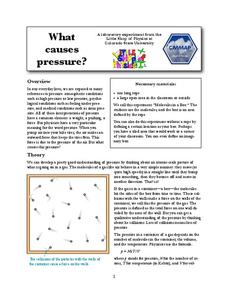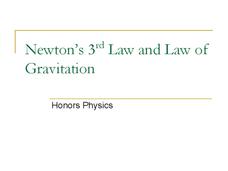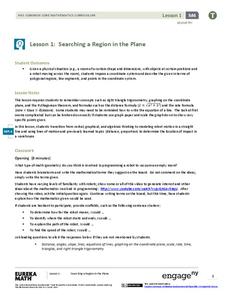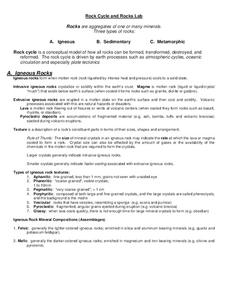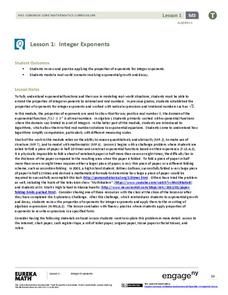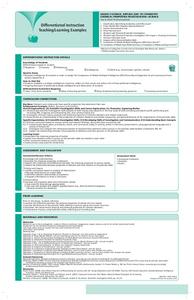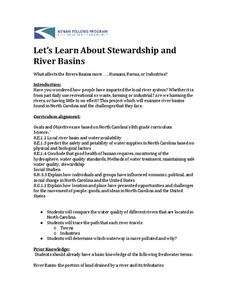Wind Wise Education
What is the Cost of Inefficiency?
What does it cost to keep the lights on? Through a hands-on activity, class members use a watt meter and determine the amount of energy different types of light bulbs use. The class then determines the financial and environmental cost of...
LABScI
Taxonomy: Who is in My family?
Find similarities in seemingly unlike organisms. The second instructional activity in a series of 12 builds the concept of a taxonomy and explores the use of a dichotomous key. Learners begin in part one by attempting to group a set of...
Colorado State University
What Causes Pressure?
Are you feeling the pressure? Let loose a little with a kinesthetic activity that models molecular motion in a closed space! The activity varies conditions such as volume and temperature and examines the effects on molecules.
DiscoverE
Hidden Alarm
It's time to wake up! Young engineers build an electric circuit that will activate an alarm. The use of switches in the circuit is a must—because you don't want the alarm to keep beeping forever!
Annenberg Foundation
Geometry 3D Shapes: Euler's Theorem
How do you get a theorem named after you? Euler knows what it takes! The third lesson of five asks pupils to use an interactive activity to compare the faces, vertices, and edges of seven different three-dimensional solids. They use...
Health Smart Virginia
Inclusion
Inclusion is the focus of a instructional activity that looks closely at how to make equal groups in cooperative settings. Using physical education activities, scholars are challenged to create groups quickly and inclusively. After...
Personal Genetics Education Project
Reproductive Genetic Testing: Technology, Access, and Decision Making
Explore the complexities of reproductive genetic testing respectfully in the learning space. Scientists read articles, view a slideshow, and complete a do-now about genetic technologies. A fishbowl activity allows scholars to discuss the...
Indian Land Tenure Foundation
A Sense of Belonging
In order to understand how the land changes over time because of the people who live there, learners interview an elderly person about the past. Children ask an older family member to describe what the local area was like when they were...
Institute of Electrical and Electronics Engineers
Fun with Speedboats!
After reading about marine engineers and naval architects, it's all hands on deck to design and test a speed boat. This instructional activity is designed for the Next Generation Science Standards in engineering and can be a centerpiece...
Curated OER
Exploring the Water Cycle
The water cycle is one of earth's most easily observable processes, but demonstrating each step within classroom walls can be a challenge. Through a series of videos and quick demonstrations, cover each aspect of the hydrologic cycle in...
Curated OER
Insects A-Z!
Alphabet insects! Who has ever heard of such a thing? Get ready because your class is going to research insects that start with a specific letter of the alphabet. In small groups, they'll use the Internet and reference texts to locate...
Exploratorium
Corner Reflector
If you set up a triad of mirrors into a corner figuration, they act as a kaleidoscope, bouncing light waves back and forth indefinitely, changing the light that your eyes perceive. Although the materials required are very specific and...
Exploratorium
Touch the Spring
Concave mirrors and the images they produce are traditional topics in the physics classroom. This resource explains how to set up an investigation of them, and it provides you with the explanation of concepts.
Illustrative Mathematics
The Lighthouse Problem
Long considered the symbol of safe harbor and steadfast waiting, the lighthouse gets a mathematical treatment. The straightforward question of distance to the horizon is carefully presented, followed by a look into the different...
Illustrative Mathematics
Seven Circles III
A basic set-up leads to a surprisingly complex analysis in this variation on the question of surrounding a central circle with a ring of touching circles. Useful for putting trigonometric functions in a physical context, as well as...
Bowels Physics
Newton's Third Law and Law of Gravitation
Why was Sir Newton so important to the field of science? Pupils discuss his contributions, specifically his Third Law, as they learn about gravity and the center of mass. They work multiple problems to ensure their understanding and...
EngageNY
Searching a Region in the Plane
Programming a robot is a mathematical task! The activity asks learners to examine the process of programming a robot to vacuum a room. They use a coordinate plane to model the room, write equations to represent movement, determine the...
University of New Orleans
Rock Cycle and Rocks Lab
Science rocks! Explore three types of rocks and the rock cycle with an igneous rocks experiment. Pupils discuss textures, composition, and learn how melts are formed from the Earth's crust. They weigh materials using a scientific scale...
EngageNY
Integer Exponents
Fold, fold, and fold some more. In the first installment of a 35-part module, young mathematicians fold a piece of paper in half until it can not be folded any more. They use the results of this activity to develop functions for the area...
EduGAINs
Chemical Properties Investigation
This lesson demonstrates differentiated instruction at its best. Over the course of 2-3 class periods, young chemists have the opportunity to gain a thorough understanding of metals and their chemical properties from a variety of...
University of Colorado
Is There Life on Earth?
To find life on another planet, scientists look for gases (atmosphere), water, and temperatures that are not extreme. In this activity, groups of pupils become "Titan-ians," scientists who want to explore Earth for possible life forms....
Science Matters
Earthquakes and Volcanoes Pre-Assessment
See how much your class knows about earthquakes and volcanic activity and how these events shape geologic features. The first lesson in the series of 20 is a pre-test to find out what pupils already know. It includes 10 vocabulary words...
Kenan Fellows
Let's Learn About Stewardship and River Basins
What does it mean to be a good steward? Middle school environmentalists learn to care for their state's waterways through research, a guest speaker, and poster activity. Groups must locate and learn more about a river basin and the human...
American Chemical Society
Diapers: The Inside Story
There shouldn't be any accidents with this activity! An inquiry-based lesson has learners explore the absorption properties of the gel compound in diapers. After testing its properties, they learn the science of the molecules that make...
Other popular searches
- Benefits of Physical Activity
- Physical Activity Games
- Daily Physical Activity
- Physical Activity Logs
- Physical Activity Pyramid
- Physical Activity Teamwork
- Physical Activity and Health
- Promoting Physical Activity
- Physical Activity Units
- Body Type Physical Activity
- Types Physical Activity
- Cooperate Physical Activity




